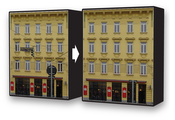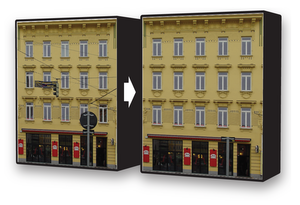Information
- Publication Type: PhD-Thesis
- Workgroup(s)/Project(s):
- Date: October 2010
- Date (Start): October 2007
- Date (End): October 2010
- TU Wien Library:
- 1st Reviewer: Werner Purgathofer
- 2nd Reviewer: Peter Wonka
- Rigorosum: 16. November 2010
- First Supervisor: Werner Purgathofer
- Keywords: facade processing, urban reconstruction, image processing
Abstract
Modeling and reconstruction of urban environments is currently the subject of intensive research. There is a wide range of possible applications, including virtual environments like cyber-tourism, computer games, and the entertainment industries in general, as well as urban planning and architecture, security planning and training, traffic simulation, driving guidance and telecommunications, to name but a few. The research directions are spread across the disciplines of computer vision, computer graphics, image processing, photogrammetry and remote sensing, as well as architecture and the geosciences. Reconstruction is a complex problem and requires an entire pipeline of different tasks.In this thesis we focus on processing of images of façades which is one specific subarea of urban reconstruction. The goal of our research is to provide novel algorithmic solutions for problems in façade imagery processing. In particular, the contribution of this thesis is the following:
First, we introduce a system for generation of approximate orthogonal façade images. The method is a combination of automatic and interactive tools in order to provide a convenient way to generate high-quality results.
The second problem addressed in this thesis is façade image segmentation. In particular, usually by segmentation we mean the subdivision of the façade into windows and other architectural elements. We address this topic with two different algorithms for detection of grids over the façade image.
Finally, we introduce one more façade processing algorithm, this time with the goal to improve the quality of the façade appearance. The algorithm propagates visual information across the image in order to remove potential obstacles and occluding objects.
The output is intended as source for textures in urban reconstruction projects. The construction of large three-dimensional urban environments itself is beyond the scope of this thesis. However, we propose a suite of tools together with mathematical foundations that contribute to the state-of-the-art and provide helpful building blocks important for large scale urban reconstruction projects.
Additional Files and Images
Additional images and videos
 image:
Processing of Façade Imagery
image:
Processing of Façade Imagery
Additional files
 thesis:
Processing of Façade Imagery
thesis:
Processing of Façade Imagery
Weblinks
No further information available.BibTeX
@phdthesis{musialski-2010-pfi,
title = "Processing of Fa\c{c}ade Imagery",
author = "Przemyslaw Musialski",
year = "2010",
abstract = "Modeling and reconstruction of urban environments is
currently the subject of intensive research. There is a wide
range of possible applications, including virtual
environments like cyber-tourism, computer games, and the
entertainment industries in general, as well as urban
planning and architecture, security planning and training,
traffic simulation, driving guidance and telecommunications,
to name but a few. The research directions are spread across
the disciplines of computer vision, computer graphics, image
processing, photogrammetry and remote sensing, as well as
architecture and the geosciences. Reconstruction is a
complex problem and requires an entire pipeline of different
tasks. In this thesis we focus on processing of images of
fa\c{c}ades which is one specific subarea of urban
reconstruction. The goal of our research is to provide novel
algorithmic solutions for problems in fa\c{c}ade imagery
processing. In particular, the contribution of this thesis
is the following: First, we introduce a system for
generation of approximate orthogonal fa\c{c}ade images. The
method is a combination of automatic and interactive tools
in order to provide a convenient way to generate
high-quality results. The second problem addressed in this
thesis is fa\c{c}ade image segmentation. In particular,
usually by segmentation we mean the subdivision of the
fa\c{c}ade into windows and other architectural elements. We
address this topic with two different algorithms for
detection of grids over the fa\c{c}ade image. Finally, we
introduce one more fa\c{c}ade processing algorithm, this
time with the goal to improve the quality of the fa\c{c}ade
appearance. The algorithm propagates visual information
across the image in order to remove potential obstacles and
occluding objects. The output is intended as source for
textures in urban reconstruction projects. The construction
of large three-dimensional urban environments itself is
beyond the scope of this thesis. However, we propose a suite
of tools together with mathematical foundations that
contribute to the state-of-the-art and provide helpful
building blocks important for large scale urban
reconstruction projects.",
month = oct,
address = "Favoritenstrasse 9-11/E193-02, A-1040 Vienna, Austria",
school = "Institute of Computer Graphics and Algorithms, Vienna
University of Technology ",
keywords = "facade processing, urban reconstruction, image processing",
URL = "https://www.cg.tuwien.ac.at/research/publications/2010/musialski-2010-pfi/",
}

